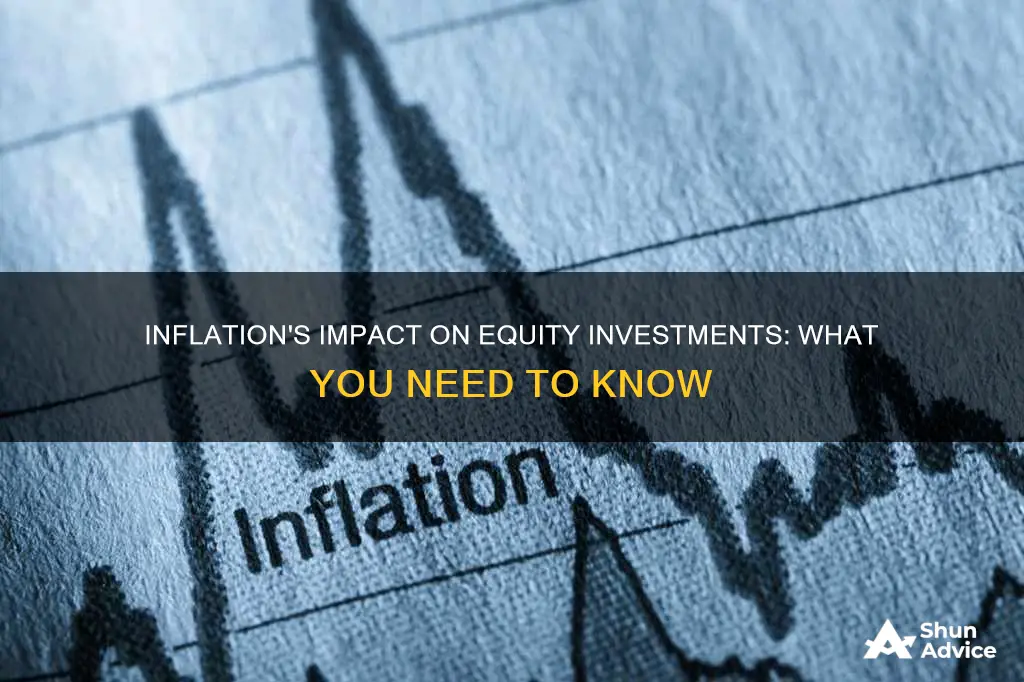
Inflation can have a significant impact on equity investments, and this relationship is complex and multifaceted. Firstly, inflation erodes the purchasing power of money, leading to a decrease in the value of investments over time. This is particularly detrimental to liquid assets, which tend to appreciate more slowly and are thus more vulnerable to inflation. Consequently, investors seek returns that outpace inflation to maintain their standard of living. Inflation also influences investor behaviour; during inflationary periods, investors may opt for safer investments or seek opportunities in the stock market.
The dynamic between inflation and equity prices varies in the short and long run. In the short term, rising inflation often leads to a decline in stock prices due to falling revenues and profits, as well as adverse macroeconomic conditions. However, in the long run, companies can adjust to inflationary pressures by passing on increased costs to consumers, potentially restoring real revenue and profit rates.
Additionally, the impact of inflation on stock prices is influenced by investor expectations and behaviour. Inflation can make investors more risk-averse, driving up the risk premium and affecting stock valuations. Moreover, the relationship between inflation and stock yields is complex, with historical data indicating a mysterious correlation that requires further exploration.
| Characteristics | Values |
|---|---|
| Effect on nominal interest rates | Inflation can erode the nominal interest rate of an investment, which is the rate of interest without any adjustment for inflation. |
| Effect on real interest rates | Inflation reduces the real interest rate, which is the nominal interest rate minus the rate of inflation. This shows the actual gain or loss in purchasing power. |
| Effect on investment returns | Inflation can eat away at investment returns, especially for investments with lower interest rates. |
| Effect on fixed income investments | Inflation can significantly reduce real returns on fixed income investments such as corporate or municipal bonds, treasuries, and CDs. |
| Effect on stock prices | Inflation can negatively impact stock prices, especially in the short term. However, in the long run, stocks can act as a hedge against inflation if companies can adjust their prices to maintain profit rates. |
| Effect on stock market volatility | Inflation can trigger market volatility as investors may make reactive choices, such as selling stocks out of fear of losing value or avoiding further investments. |
| Effect on specific types of stocks | Value stocks tend to outperform growth and income stocks during periods of high inflation. Growth stocks may drop in price, while income stocks may suffer from dividend payments that fail to keep up with inflation. |
| Effect on investment portfolios | A well-diversified investment portfolio can act as a hedge against inflation in the long run, as companies adjust to higher input costs and raise prices. |
| Effect on purchasing power | Inflation erodes purchasing power, reducing the amount of goods and services that can be bought with the same amount of money. This can impact both consumers and investors. |
| Effect on savings | Inflation can shrink savings, including retirement savings, as the buying power of money decreases over time. |
| Effect on consumer spending | Inflation can lead to reduced consumer spending, delayed purchases, and less borrowing. |
| Effect on business operations | Inflation can make it challenging for businesses to sell their products and services due to rapidly changing prices and difficulty in budget planning. |
| Effect on wages | Inflation can lead to wage increases as employees seek to maintain their purchasing power. |
| Effect on economic growth | Inflation can stimulate economic growth by increasing consumer spending and business investment in the short term. However, high and prolonged inflation can negatively impact economic growth. |
What You'll Learn

Inflation and stocks in the long run
The relationship between inflation and stock prices is complex, and each stock should be evaluated on its own merits. However, in the long run, shares can act as a hedge against inflation. This means that the monetary value of a stock or share portfolio can appreciate over an inflationary period so that the 'real' wealth it stores – the goods or services it can be exchanged for – remains constant despite higher prices.
If inflation stems from higher input costs (known as cost-push inflation), businesses will eventually adapt to the inflationary pressures and adjust their prices. As a result, revenues will increase, and normal profit rates may resume. The higher input costs are simply passed on to consumers after a period of price revision. This is probably more realistic for a well-diversified portfolio rather than an individual stock that carries its own idiosyncratic risk.
In the long run, companies pass on increased input costs to consumers. Given enough time, this means that real revenues and profit rates may return to normal levels, making a diversified non-leveraged portfolio a possible hedge against inflation over the long term.
Inflation-protected securities such as inflation-indexed bonds or Treasury Inflation-Protected Securities (TIPS) can also protect your purchasing power and investment returns over the long run. These types of investments move with inflation and are therefore immune to inflation risk.
Value stocks tend to outperform growth and income stocks during periods of higher inflation. Value stocks are shares that have a higher intrinsic value than their current trading price. They are frequently shares of mature, well-established companies with strong current free cash flows that may diminish over time. During periods of high inflation, shares associated with larger current cash flows are more valuable than growth stocks that promise more distant returns.
Research indicates that growth stocks drop in price during high inflation. Growth stocks are long-term investments, and worthwhile returns could only be expected after they have had a chance to mature and consistently produce better-than-average results. When discounting growth stocks to a present value, the fact that the expected cash flows are still some time away means that the compounded discount rate will adversely impact the current share price.
Inflation and Stocks in the Short Run
In the short run, the relationship between equity prices and inflation is often inverse – as inflation rises, stock prices fall, and vice versa. This could be due to a range of factors, including falling short-term revenue and profits, a general economic slowdown, and monetary policy responses that induce higher short-term interest rates.
Theories addressing the negative correlation between inflation and stocks argue that, as equity prices are determined by the market's estimate of a stock's value, the lowered demand could be a by-product of market participants' equity valuation methods.
Change Management: Invest in Your Business's Future Success
You may want to see also

Inflation and stocks in the short run
The relationship between inflation and stock prices is complex, and analysts suggest that the short-term dynamic is less favourable. The relationship between equity prices and inflation is (quite frequently) an inverse correlation – as inflation rises, stock prices fall, and vice versa.
The adverse effect of inflation on stock prices in the short term could result from a range of factors, including falling short-term revenue and profits, which create a drag on share prices. A general economic slowdown can also result in an unfavourable macroeconomic environment for the stock market and consumer spending in general.
A monetary policy response to inflation can induce higher short-term interest rates, causing investors to substitute stocks for lower-priced bonds. The prospect of lowered, or even negative, real returns can also lower the demand for equity investment. In inflationary environments, investors need to make higher returns from a stock portfolio to ensure a positive real return.
Theories addressing the negative correlation between inflation and stocks also argue that as equity prices are determined by the market’s estimate of a stock’s value, the lowered demand could possibly be a by-product of market participants’ equity valuation methods.
A widely used valuation technique in the world of finance is discounting expected future cash flows to their respective present values. The 'present value' of a future cash flow is the best estimate of what the future cash flow is worth in today’s money. The present value formula is as follows:
C = future cash flow amount
I = interest rate (frequently called the ‘discount rate’)
N = number of times the interest rate is to be compounded (eg an annualised interest rate is compounded five times if the cash flow is to be paid five years in the future)
The present value equals the future cash flow ‘C’ divided by an appropriate interest rate, (1 + i)n. The interest rate is often referred to as the ‘discount rate’.
A cash flow of £100 one year from now, at a discount rate of 5%, equals a present value of about £95.24. The larger the discount rate, the smaller the present value. The present value of a cash flow of £100 five years from now, at 5%, is about £78.35 – the further into the future the flow, the lower the present value.
If the inflation rate is used as an input in determining the discount rate, then a higher inflation rate will cause a higher discount rate. For example, consider a stock that pays stable dividends at predictable and regular intervals. In this case, the value of the stock could be reduced to the sum of all the future dividend payments discounted to their present value. This is the basis of the dividend discount model (DDM).
When using the DDM, the higher inflation-adjusted discount rate acts to diminish the present value of each expected future dividend more than it would have before inflation. This, in turn, lowers the current price of the stock.
JPMorgan's Emerging Manager Program: Investment Opportunities?
You may want to see also

Inflation and the performance of value stocks
For example, £100 in one year discounted at 5% inflation is worth £95.24 today, but £100 in five years is only worth £78.35. This means that value stocks, which derive a relatively greater proportion of their valuation from current earnings, are preferred by investors during inflationary periods.
Value stocks have historically been a better inflation hedge than gold. Research suggests that value stocks are preferred by investors when inflation is high. This is because their prices haven't kept up with their peers, and they are relatively immune to higher inflation. Value stocks have outperformed growth stocks by the most when inflation is higher.
However, the relationship between inflation and equity prices is complex, and there is no catch-all rule. A prudent investment strategy requires a thorough analysis of the specific characteristics of each stock.
Maximizing HSA Savings: Investment Strategies for Tax-Free Growth
You may want to see also

Inflation and the performance of growth stocks
Inflation and its impact on equity investments is a complex topic, and the relationship between inflation and stock prices is intricate. While inflation can affect all stocks, growth stocks tend to be more sensitive to changing interest rates and inflationary pressures. Here is an in-depth look at inflation and the performance of growth stocks:
Impact of Inflation on Growth Stocks:
- Inverse Relationship: Growth stocks tend to have an inverse relationship with inflation in the short term. As inflation rises, stock prices tend to fall, and vice versa. This is because higher inflation can lead to falling short-term revenues and profits, an unfavourable macroeconomic environment, and higher interest rates, all of which can negatively impact stock prices.
- Discounted Cash Flows: Growth stocks are valued based on expected future cash flows. When discounting these future cash flows to their present value, a higher inflation rate leads to a higher discount rate. This, in turn, reduces the present value of the expected cash flows, negatively impacting the current share price of growth stocks.
- Interest Rate Sensitivity: Growth stocks are particularly sensitive to rising interest rates. As central banks often increase interest rates to combat high inflation, growth stocks can be adversely affected. Higher interest rates make the future cash flows of growth stocks less valuable in present value terms.
- Performance during High Inflation: Research indicates that growth stocks tend to drop in price during periods of high inflation. This is because growth stocks are typically shares of companies that do not show strong current cash flows but have the potential to outperform in the future. Investors tend to favour value stocks, which have higher intrinsic value and stronger current cash flows during inflationary times.
- Impact on Company Fundamentals: Inflation can also impact the fundamentals of companies that issue growth stocks. Higher inflation may cause companies to face higher input costs, squeezing profit margins. This can lead to reduced earnings growth and a negative impact on the share price.
- Long-Term Perspective: However, it is important to note that the relationship between inflation and growth stocks is not static and can vary over time. In the long run, growth stocks can provide a hedge against inflation as companies adjust to higher input costs and resume normal profit rates.
Mitigating the Impact:
To mitigate the impact of inflation on growth stocks, investors can consider the following strategies:
- Fundamental Analysis: Focus on the fundamentals of the underlying companies. Seek companies with strong pricing power, high gross margins, and low capital intensity. These characteristics can help protect earnings power from inflationary pressures.
- Diversification: Diversify your portfolio by including a mix of value stocks, income stocks, and growth stocks. Value stocks tend to outperform during high inflation, while growth stocks shine during low inflation. Diversification can help balance the risks and rewards of different stock categories.
- Long-Term Horizon: Adopt a long-term investment horizon. Growth stocks are typically long-term investments, and their returns may not be immediate. By focusing on the long term, you can benefit from the potential future outperformance of growth stocks once inflationary pressures ease.
- Sector Allocation: Consider sectors that have historically performed well during high inflation. Energy, utilities, consumer staples, and healthcare sectors have shown resilience during inflationary periods.
Investment Trust Savings Schemes: How Do They Work?
You may want to see also

Inflation and the performance of income stocks
Income stocks, or stocks that pay regular and stable dividends, are vulnerable to inflation. If the rate of inflation exceeds the dividend rate, the stock price will fall until the dividend rises to meet inflation. This is because the real return on investment is negative when inflation outpaces the interest rate.
For example, if a stock pays a 3% dividend but inflation is 5%, the real return on investment is -2%. This means that the investor is losing 2% of their money in real terms.
The impact of inflation on income stocks can be mitigated if companies are able to pass on the costs to consumers by raising prices. If revenues and free cash flows rise, dividends will also increase, and share prices may appreciate to reflect the higher valuation.
However, international companies may experience falling share prices when inflation increases. If a company raises prices too much, it risks becoming uncompetitive if foreign players in the same market are able to keep prices constant.
In the short term, income stocks may suffer a diminished price due to a decreased present value of dividends and future cash flows. This is because the discount rate used to calculate the present value of future cash flows is often adjusted for inflation, resulting in a higher discount rate and a lower present value.
During periods of high inflation, value stocks, or shares that have a higher intrinsic value than their current trading price, tend to outperform income stocks. This is because shares associated with larger current cash flows are more valuable than stocks that promise more distant returns.
In summary, income stocks are susceptible to inflation, particularly in the short term. To protect against inflation, investors should look for companies that are able to adjust to higher input costs by raising prices or switching to alternative inputs, thereby preserving their purchasing power.
Equity Investment: India's Participation and Prospects
You may want to see also
Frequently asked questions
In the short term, inflation can have an adverse effect on stock prices. This is due to a range of factors, including falling short-term revenue and profits, a general economic slowdown, and higher interest rates.
In the long run, companies can pass on increased input costs to consumers, and revenues and profit rates may return to normal levels. This makes a diversified non-leveraged portfolio a possible hedge against inflation over the long term.
The relationship between inflation and stock prices is complex and depends on various factors. Each stock should be evaluated on its own merits.
To maintain your standard of living, your investment returns should be equal to or greater than the inflation rate. Otherwise, your investments are losing money in real terms, even if they gain in dollar value.
You can protect your investments from inflation by investing in inflation-protected securities such as inflation-indexed bonds or Treasury Inflation-Protected Securities (TIPS). These investments move with inflation and are immune to inflation risk.







